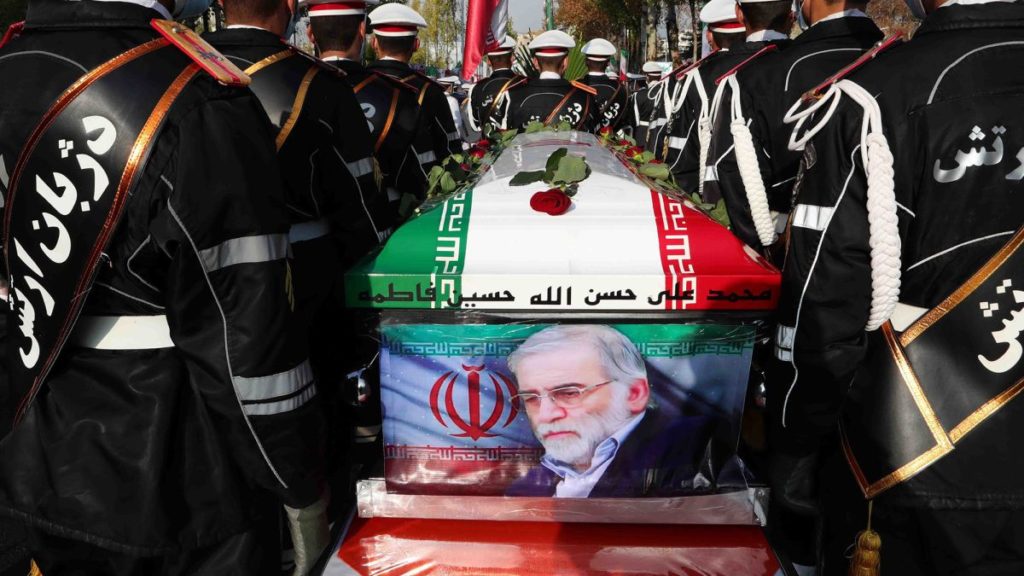IN THE MEDIA
How Biden (and Australia) should pressure Iran
December 3, 2020 | Jamie Hyams

An edited version of this article was published in the Daily Telegraph, Dec. 3, 2020
The freeing of Kylie Moore-Gilbert, the Australian academic imprisoned in Iran on trumped-up espionage charges, and the killing of Mohsen Fakhrizadeh, the head of Iran’s nuclear program, have seen Iran highlighted in our news recently. They have also demonstrated yet again the true nature of Iran’s Islamist regime.
Dr Moore-Gilbert was effectively a hostage, and was exchanged for three Iranian terrorists arrested in Bangkok in 2012 for an attempted attack on Israeli diplomats there. The regime in fact regularly uses hostage-taking as an instrument of foreign policy, and many other hapless foreign visitors have found themselves held in Iran on obviously trumped-up charges.
The fact that Iranian agents were in Bangkok to carry out a terrorist act is also far from unusual. The regime has a track record of using its agents and terror proxies to carry out assassinations and bomb attacks across Asia, Europe and the Americas, targeting exiled dissidents, diplomats, US military bases, and Jewish community facilities and other civilian sites.
Targets have included the Saudi Ambassador to the US, the Israeli embassy and Jewish community centre in Buenos Aires, Argentina, which between them killed 115 people in 1992 and 1994, and US bases in Lebanon in 1983 and Saudi Arabia in 1996, killing 260.
Fakhrizadeh, widely described as a scientist, was also a Brigadier-General in the Islamic Revolutionary Guard Corps (IRGC). The IRGC is not only the main instrument of hardline control and repression within Iran, but is also charged with spreading the revolution. It does so largely by organising, funding and controlling various proxy terror groups and militias across the Middle East, and even further afield.
These include Hezbollah, which has well over 100,000 missiles pointed at Israel, and has reduced Lebanon, which it controls, to a failed state with insurmountable debts. The IRGC also played a lead role in fighting for Syrian dictator Bashar al-Assad in that country’s brutal civil war; arming the Houthis, which overthrew the Yemen government and have now embroiled the country in a devastating civil war; and arming and funding Hamas and Palestinian Islamic Jihad (PIJ), which regularly fire rockets into Israel from Gaza, while Hamas, which rules Gaza, has initiated three costly major skirmishes with Israel. Furthermore, the IRGC runs various militia groups in Iraq, which prevent the legitimate government exercising control there.
The IRGC also controls Iran’s nuclear weapons program, so basically, Fahkrizadeh was a senior officer in a terrorist military organisation more powerful than Iran’s army, leading an illegal nuclear weapons program.
Also shedding light on the nature of Iran’s regime was the August killing in Teheran of al-Qaeda second in command Abu Muhammad al-Masri, reportedly by Israeli agents. It might be expected that Shi’ite fundamentalist Iran and Sunni fundamentalist al-Qaeda would be bitter enemies, but from all reports al-Masri was part of a major al-Qaeda operational hub in Teheran, planning attacks on Western targets with Iran’s aid.
So, while the nature of Iran’s regime and the need to prevent it acquiring nuclear weapons are clear, what to do about it has been anything but straightforward.
The 2015 Joint Comprehensive Plan of Action (JCPOA) nuclear deal was an attempt to deal with the problem using diplomacy. In exchange for Iran temporarily shutting down parts of its nuclear program and scaling back others, sanctions against Iran were eased, freeing up billions of dollars the regime could use to hopefully improve the lives of its citizens. The theory was that Iran would then behave like a more responsible nation.
Unfortunately, the JCPOA had many fatal flaws. There are various sunset provisions, which mean crucial prohibitions against various activities, such as enriching uranium to military-grade levels, simply run out. In the meantime, loopholes in the inspection regime allowed Iran to quietly continue its nuclear weapons program – and to develop nuclear-capable missiles, a crucial issue the JCPOA ignored completely.
It also did nothing to address Iran’s rogue state behaviour, and in fact, the billions of dollars freed up by the deal supercharged these activities, rather than making Iran more responsible. Teheran’s terror proxies are now far better armed and resourced.
Due to these profound flaws, US President Donald Trump withdrew the US from the deal, instead imposing a very effective maximum pressure campaign of sanctions, which has been putting immense pressure on the regime, while also forcing it to restrict funding to its rogue activities.
So what should happen now? Given his determination to re-enter the JCPOA, US President-elect Joe Biden should at least use the pressure of the current US sanctions as leverage to negotiate a far better deal that closes the loopholes, addresses all of Iran’s rogue behaviour and prohibits Teheran from ever obtaining nuclear weapons. He should be supported in this by JCPOA co-signatories the UK, France and Germany, and the rest of the Western world, including Australia.
It must be made absolutely clear to Iran that the international community will no longer tolerate its exporting of terrorism, its destabilising of its neighbours, its clandestine nuclear weapons program and the rest of its unacceptable rogue behaviour.
Jamie Hyams is a Senior Policy Analyst at the Australia/ Israel & Jewish Affairs Council.
Tags: Australia, IRGC, Iran, JCPOA, Kylie Moore-Gilbert





